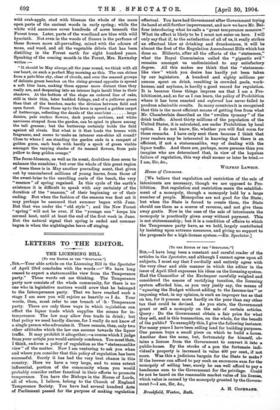THE LICENSING BILL.
• SIR,—Your able article on the Licensing Bill in the Spectator of April 23rd concludes with the words :—" We have long ceased to expect a statesmanlike view from the Temperance party." These words set me thinking. The Temperance party now consists of the whole community, for there is no one who in legislative matters would avow that he belonged to the Intemperance party. That we have reached such a stage I am sure you will rejoice as heartily as I do. Your words, then, must refer to one branch of h Temperance party. There are only three ways in which legislation can affect the liquor trade which supplies the means for in- temperance. The law may allow free trade in drink ; but that policy we need hardly discuss, for I really do not know of a single person who advocates it. There remain, then, only two other attitudes which the law can assume towards the liquor traffic. It may prohibit it altogether,—a course which I judge from your arti9le you would entirely condemn. You must then, I think, endorse a policy of regulation as the "statesmanlike view" of the matter. Now I am venturing to ask you when and where you consider that this policy of regulation has been successful. Surely it has had the very best chance in this country. Here we have a very large, and to some extent influential, portion of the community whom you would probably consider rather fanatical in their efforts to promote temperance. You have the Bishops in the House of Lords, all of whom, I believe, belong to the Church of England Temperance Society. You have had several hundred Acts of Parliament passed for the purpose of making regulation effectual. You have had Government after Government trying its hand at still further improvement, and now we have Mr. Bal- four introducing what he calls a "great temperance measure." What its effect is likely to be I must not enter on here. I will only say that if, to the satisfaction of all of us, it really strikes an effectual blow at drinking and drunkenness, it will be almost the first of the Regulation Amendment Bills which has done so. Hitherto, after all the efforts of the "statesmen," what the Royal Commission called the "gigantic evil" remains amongst us undiminished to any satisfactory degree. Au this makes me think that the "statesman- like view" which you desire has hardly yet been taken by our legislators. A hundred and eighty millions per annum spent on drink, resulting in crowded gaols, work- houses,' and asylums, is hardly a good record for regulation. It is because these things impress me that I am a Pro- hibitionist, and, so far as I can learn, the policy of Prohibition where it has been enacted and enforced has never failed to produce admirable results. In many countries it is recognised that this is the most efficient means of getting free from what Mr. Chamberlain described as the "swollen tyranny" of the drink traffic. About thirty millions of the population of the United States, it is calculated, are under Prohibition by local option. I do not know, Sir, whether you will find room for these remarks. I have only sent them because I think that your readers may be interested in knowing that there is an efficient, if not a statesmanlike, way of dealing with the liquor traffic. And there are, perhaps, more persons than you imagine who are determined that, in view of the hopeless failure of regulation, this way shall sooner or later be tried.— I am, Sir, &c.,
WILFRID LAWSON. House of Commons.
[We believe that regulation and restriction of the sale of intoxicants are necessary, though we are opposed to Pro- hibition. But regulation and restriction mean the establish- ment of a monopoly, though a monopoly held by a large number of people. Monopolies are not good for the State ; but when the State is forced to create them, the State should use them as a source of revenue, and not give them away gratis. Now in the case of the sale of intoxicants the monopoly is practically given away without payment. This is not statesmanship ; but it is a condition of affairs to which the Temperance party have, as we hold, largely contributed by insisting upon extreme measures, and giving no support to the proposals for a high-license system.—En. Spectator.]






















































 Previous page
Previous page